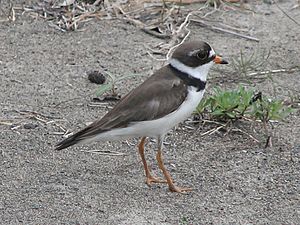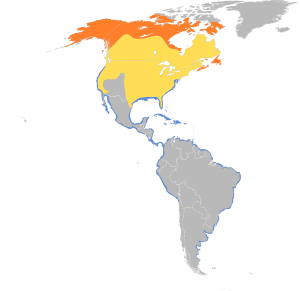Semipalmated plover facts for kids
Quick facts for kids Semipalmated plover |
|
|---|---|
 |
|
| Breeding plumage, Nunavut, Canada | |
| Conservation status | |
| Scientific classification |
|
| Kingdom: | Animalia |
| Phylum: | Chordata |
| Class: | Aves |
| Order: | Charadriiformes |
| Family: | Charadriidae |
| Genus: | Charadrius |
| Species: |
C. semipalmatus
|
| Binomial name | |
| Charadrius semipalmatus (Bonaparte, 1825)
|
|
 |
|
| Script error: The function "autoWithCaption" does not exist. | |
| Synonyms | |
|
Charadrius hiaticula semipalmatus |
|
Script error: No such module "Check for conflicting parameters".
The semipalmated plover (Charadrius semipalmatus) is a small bird. It is a type of plover, known for its short beak and quick movements. Its name, semipalmated, means "half-webbed". This refers to its feet, which have small webs between the toes. This helps the plover walk on soft mud and sand.
Contents
What Does a Semipalmated Plover Look Like?
This bird is quite small. It weighs about 22 to 63 grams, which is like a few strawberries. It measures 14 to 20 centimeters long, about the size of a small ruler. Its wings can spread out 35 to 56 centimeters wide.
Adult plovers have a grey-brown back and wings. Their belly is white, and they have a single black band across their chest. They have a brown cap on their head and a white forehead. A black mask goes around their eyes. Their short beak is orange and black.
Where Do Semipalmated Plovers Live?
Semipalmated plovers breed in northern Canada and Alaska. They like open areas like beaches or flat lands. They make their nests on the ground. These nests are usually in open spots with very few plants.
These birds are migratory. This means they travel long distances for winter. They spend winter in warm coastal areas. These places include the southern United States, the Caribbean, and much of South America. Sometimes, they fly off course. They have been seen in places like Tierra del Fuego and the Isles of Scilly.
How Do Semipalmated Plovers Behave?
Semipalmated plovers look for food on beaches. They also search in tidal flats and open fields. They usually find their food by sight. Their diet includes insects, small crustaceans, and worms.
This bird looks a bit like a killdeer. However, the semipalmated plover is much smaller. It also has only one black band on its chest, while the killdeer has two. Since these plovers nest on the ground, they have a special trick. If an animal or person gets too close to their nest, they do a "broken-wing" display. They pretend to have a broken wing to lead the intruder away from their eggs or chicks. This display is similar to what the related killdeer does.
Gallery
-
Illustration (John James Audubon)
See also
 In Spanish: Chorlo semipalmado para niños
In Spanish: Chorlo semipalmado para niños
 | Percy Lavon Julian |
 | Katherine Johnson |
 | George Washington Carver |
 | Annie Easley |






